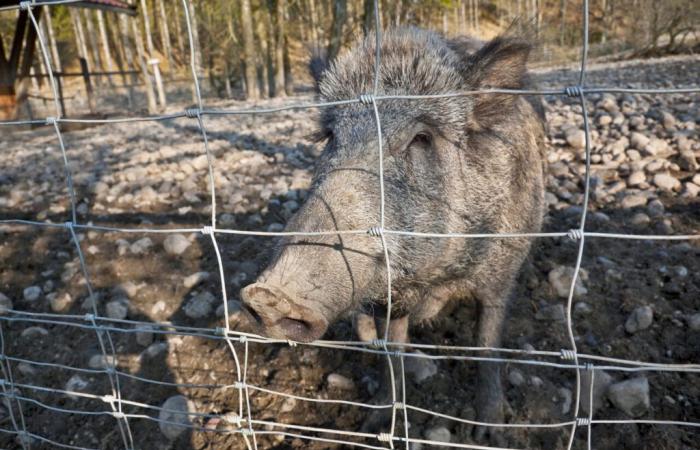Par
Martin Leduc
Published on
Jan 18, 2025 at 4:04 p.m.
; updated Jan 18, 2025 at 4:51 p.m.
Lately, Rillette has been in the media a lot. Rillette is a sow (the female of the wild boar)saved by Elodie, a breeder, in Aube. After a few years of cohabitation, the animal and its rescuer became very close friends, and Elodie thought she would have happy days with this truly wonderful pet. not banal.
Even if the sow only knew her, she basically has no right to keep the animal. The Aube prefecture also offered him a fallback solution: place Rillette in a specialized center… or euthanize him. This is French law. In addition to losing her animal, with whom she has lived for more than a year, Elodie risks three years of imprisonment and a fine of 150,000 euros.
Rillette saved?
This Thursday, January 16, 2025, administrative justice suspended the decision of the prefect of Aube. Elodie Capé's request will have to be re-examined within a month, which gives the sow a reprieve. Before Rillette is completely at peace, the prefecture will have to grant an exemption, but things are moving in the right direction for the life of the young animal.
The wild boar, no, but the dromedary, yes
Before talking about the rules that must be followed to legally adopt a wild animal, it is important to define what it is exactly: an animal that is not domestic.
To establish the list of animals that it considers domestic, Justice relied on several literary works. We will not write the complete list here, it is very long. We can still cite a few examples which seem to stand out a little, between dogs, cats, and other hamsters:
- the dromedary (Camelus dromedarius)
- domestic breeds of the camel (Camelus bactrianus)
- the lama (Lama glama)
- l'alpaga (Lama pacos)
- le renne d'Europe (Rangifer enclosure)
- domestic breeds of beef (Bos taurus)
- le yack (Bos grunniens)
- the zebu (Bos indicus)
- buffalo (Bubalus bubalis)
All the animals considered domestic can be found in the annex to the decree of August 11, 2006 establishing the list of species, breeds or varieties of domestic animals, published in Official Journal. And the wild boar is not one of them.
-Some establishments may have wild animals… under conditions
Only three types of establishments are authorized to take in animals considered non-domestic:
- The establishments ofbreeding professional or non-professional;
- mobile public presentation establishments: traveling circus-type showswho will no longer have the right to do so from 1is December 2028;
- fixed establishments for presentation to the public: the zoos.
That's not all. To have a wild animal on their premises, these entities must:
- Have accommodation, facilities and equipment designed to guarantee the well-being of the animals housed, i.e. meet their physiological and behavioral needs;
- have the skills required and adapted to the species and number of animals so that they are maintained in good health and maintenance;
- prevent risks relating to its security as well as the security and peace of third parties;
- prevent the introduction of animals into the natural environment and the transmission of human or animal pathologies.
Note that certain exceptions may exist for wild boars, upon exemption, and to the extent that the animal can live in good conditions (which is the case for Élodie).
Precedents
However, it is necessary to declare the animal to the prefecture. This is what made it possible to save Maurice, a wild boar who found himself in the same situation in 2022, and who obtained authorization to stay with his host family in Corrèze, as told France 3.
Toto, another wild boar who hit the headlines in 2023, had, for his part, been entrusted to an animal park. But not euthanized.
Follow all the news from your favorite cities and media by subscribing to Mon Actu.






